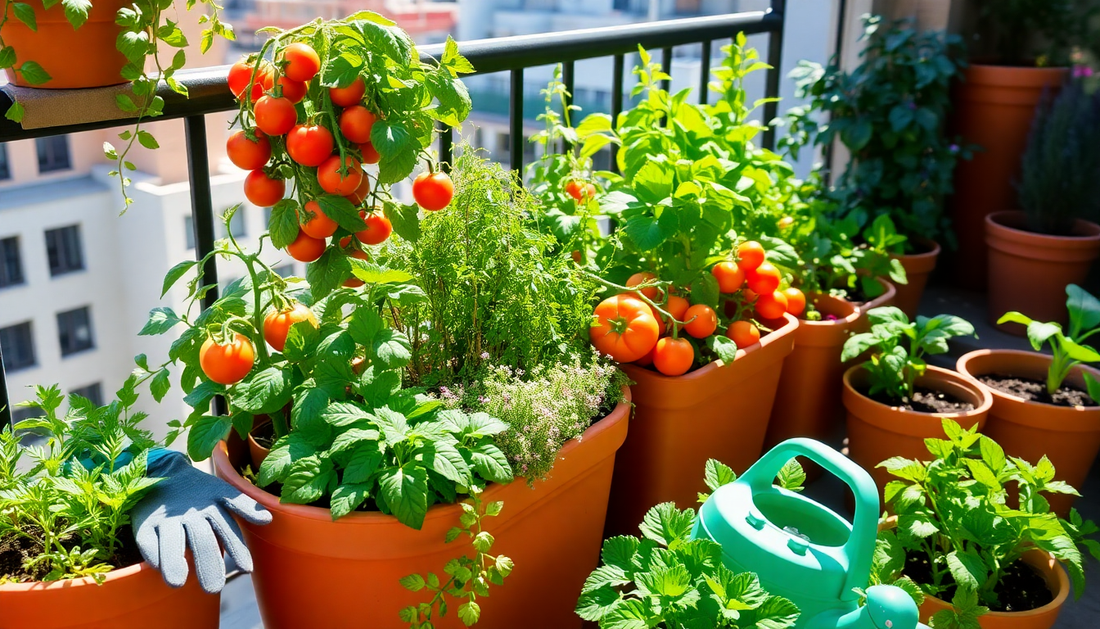
Grow Your Own Veggies: A Guide to Starting a Thriving Container Garden
Share
In today's fast-paced world, where space is at a premium, the idea of growing your own fresh produce can seem like an unattainable dream. But fear not, urban dwellers and small-space gardeners – the solution lies in the art of container gardening. With a little creativity and the right know-how, you can transform even the tiniest of balconies, patios, or windowsills into a thriving oasis of homegrown goodness.
At Idyl, our mission is to empower you to embrace the joys of container gardening and reap the bountiful rewards of your very own vegetable patch. Whether you're a seasoned green thumb or a complete novice, our comprehensive guide will walk you through the steps to cultivate a successful and sustainable container garden.
Choosing the Right Containers
The foundation of a successful container garden lies in the vessels you choose to house your plants. While the options are endless, from traditional terracotta pots to innovative self-watering planters, the key is to select containers that meet the specific needs of your chosen vegetables.
When it comes to size, bigger is often better. Opt for containers with a depth of at least 12 inches to accommodate the root systems of your plants. This will ensure they have ample room to grow and thrive. Additionally, consider the weight of your containers, as they'll need to be sturdy enough to support the soil, plants, and any water they may hold.
Selecting the Perfect Produce
The beauty of container gardening lies in its versatility. From juicy tomatoes and crisp lettuce to fragrant herbs and vibrant peppers, the possibilities are endless. When choosing your crops, consider factors such as growth habits, sunlight requirements, and compatibility with your container size.
For example, bush-type tomatoes and compact varieties of leafy greens are well-suited for smaller spaces, while trailing vines like cucumbers and squash may require larger containers or even trellises for support. By carefully selecting your produce, you can maximize the bounty from your limited growing area.
Mastering the Soil
The quality of your soil is crucial to the success of your container garden. Opt for a high-quality potting mix that is specifically formulated for container gardening. These mixes are typically lighter and more well-draining than traditional garden soil, which is essential for preventing waterlogging and ensuring optimal root growth.
Remember to replenish your soil regularly, as the nutrients will be depleted over time. Incorporate organic matter, such as compost or aged manure, to provide a steady supply of nutrients for your plants. Additionally, consider using a slow-release fertilizer to maintain a balanced and consistent nutrient profile throughout the growing season.
Watering Wisely
One of the most critical aspects of container gardening is maintaining the right moisture levels. Unlike in-ground gardens, the soil in containers can dry out much more quickly, requiring more frequent watering.
To ensure your plants receive the hydration they need, check the soil regularly and water when the top inch or two begins to feel dry. Avoid letting the soil become completely dry, as this can lead to stress and stunted growth. Conversely, be mindful of overwatering, which can cause root rot and other issues.
Consider investing in self-watering planters or installing a drip irrigation system to take the guesswork out of watering and ensure a consistent moisture level for your plants.
Maximizing Space with Vertical Gardening
When working with limited space, it's essential to think vertically. Incorporate trellises, cages, or stakes to support climbing and vining crops, such as tomatoes, cucumbers, and pole beans. This not only saves valuable ground space but also allows your plants to reach their full potential by providing the necessary support.
Additionally, you can explore the concept of "stacking" your containers, placing smaller pots on top of larger ones to create a tiered effect. This clever arrangement can dramatically increase the number of plants you can grow in a single area.
Embracing Companion Planting
Companion planting is a time-honored technique that can greatly benefit your container garden. By strategically pairing certain plants together, you can enhance their growth, deter pests, and create a more balanced and resilient ecosystem.
For example, planting marigolds alongside your tomatoes can help repel harmful insects, while basil and tomatoes are known to be mutually beneficial, with the basil helping to improve the flavor of the tomatoes.
Experiment with different companion planting combinations to discover what works best for your specific setup and growing conditions.
Maintaining a Healthy Garden
Keeping your container garden thriving requires a bit of ongoing care and attention. Regular weeding, pruning, and pest management are essential to ensure your plants continue to flourish.
Be vigilant for any signs of disease or insect infestations, and address them promptly using organic and eco-friendly methods. Regularly deadhead spent flowers to encourage continued blooms and productivity.
Additionally, don't forget to rotate your crops seasonally to prevent nutrient depletion and maintain soil health. By staying on top of these maintenance tasks, you can enjoy a bountiful harvest throughout the growing season.
Embracing the Joys of Container Gardening
Starting a container vegetable garden may seem like a daunting task, but with the right guidance and a little bit of patience, you can transform even the smallest of spaces into a thriving oasis of homegrown goodness.
At Idyl, we're passionate about empowering urban dwellers and small-space gardeners to embrace the joys of container gardening. Whether you're looking to supplement your grocery budget, reduce your carbon footprint, or simply connect with nature, our comprehensive guide and top-quality gardening supplies can help you cultivate a successful and sustainable container garden.
So, what are you waiting for? Dive in, get your hands dirty, and start growing your own delicious and nutritious produce today!
